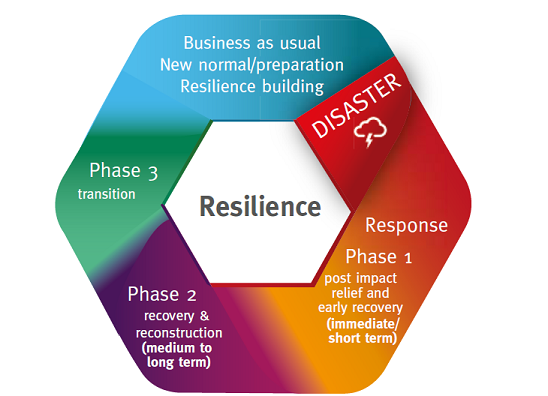Recover After a Disaster
Recovery Overview
Disaster recovery is the coordinated process of supporting disaster-affected communities’ psychosocial (emotional and social) and physical well-being; reconstruction of physical infrastructure; and economic and environmental restoration (including regeneration of the natural environment, associated infrastructure and heritage sites and structures, and the management of pollution and contamination).
Following the impact of an event the Burdekin Local Disaster Management Group has the responsibility for acting on behalf of the community they serve and leading recovery efforts, accordingly recovery in the Burdekin Shire will be managed through the Local Disaster Management Group.
Recovering from an event includes the following:
- Providing personal support to individuals affected by the event, including temporary accommodation, temporary hospital accommodation, emergency medical supplies, material assistance and counselling services;
- Providing relief measures to assist persons affected by the event who do not have resources to provide for their own personal wellbeing;
- Restoring essential infrastructure in the area/s affected by the event;
- Restoring the environment in areas affected by the event;
- Supporting community development activities to restore capacity and resilience.
Community-led Recovery
Successful recovery is responsive and flexible, engaging communities and empowering them to move forward.
Community-led recovery:
- Centres on the community and encourages those affected by an event to actively participate in their own recovery
- Seeks to address the needs of all affected communities
- Allows individuals, families, businesses and communities to manage their own recovery, with the support of government and the community and private sectors
- Considers the values, culture and priorities of all affected communities
- Uses and develops community knowledge, leadership and resilience
- Recognises that communities may choose different paths to recovery and that communities recover at different paces
- Ensures the specific and changing needs of affected communities are met with flexible and adaptable policies, plans and services
- Builds strong partnerships between communities and those involved in the recovery process.
Recovery Principles
The Principles for Disaster Recovery , as detailed in the Queensland Recovery Plan 2018 are detailed below.
The key principles of recovery are:
- Understanding the context
- Recognising complexity
- Using local, community-led approaches
- Ensuring coordination of all activities
- Employ effective communication
- Acknowledging and building capacity
- Identifying lessons and building resilience
Recovery Functions
Effective recovery requires an integrated, multi-disciplinary approach which is a coordinated effort by all organisations involved. As recovery is a complex and potentially protracted process, to assist with overall and effective coordination, aspects of recovery are conceptually grouped into five inter-related functions applicable in an all hazards environment.
These five functions of recovery are:
- Human and Social
- Economic
- Environmental
- Infrastructure
- Roads and Transport
Phases of Recovery

Phases of Recovery
Phase one: post-impact relief and early recovery
- Impact and damage assessments will be undertaken.
- At the state level a SRC will be appointed, if required.
- At the local and district levels, recovery groups will be established. It includes the transition from immediate post-disaster response operations to short-term recovery operations, as well as development, planning, consultation and implementation of a recovery plan.
- Concurrently, recovery works will be undertaken.
- This phase may occur parallel to response and ends when all disaster response activities are assumed by relevant agencies for recovery and reconstruction.
Phase two: recovery and reconstruction
- This phase includes medium-term recovery and sees the integrated execution of the deliberate, methodical recovery, and reconstruction to achieve an enhancement in outcomes for disaster affected individuals, communities, functions and infrastructure.
- During this phase, coordination of ongoing impact assessments, community engagement, communication and collaboration between functional and recovery groups at all levels continues. The SRPPC/LRC/DRC monitors progress across all areas of recovery and identifies overlapping issues, reinforcing as required with resources and capability to ensure that the momentum of recovery and reconstruction is maintained.
- This phase ends when the progressive achievement of strategic milestones, as detailed in the relevant recovery plan, is sufficiently advanced to enable the transition of responsibilities from the SRPPC to the responsible agencies or service deliverers.
Phase three: transition
- This phase sees a progressive handover of recovery and reconstruction responsibilities to agencies or organisations including government, local government, community-based or industry-led sectors that would normally support the functional area.
- Transition identifies lessons and implements improvements to increase resilience as part of recovery.
- Phase three ends when all recovery and reconstruction responsibilities are managed as business as usual, namely when recovery efforts can be delivered without the support of additional resources.
- This phase the community realises its post-disaster “new normal”.

